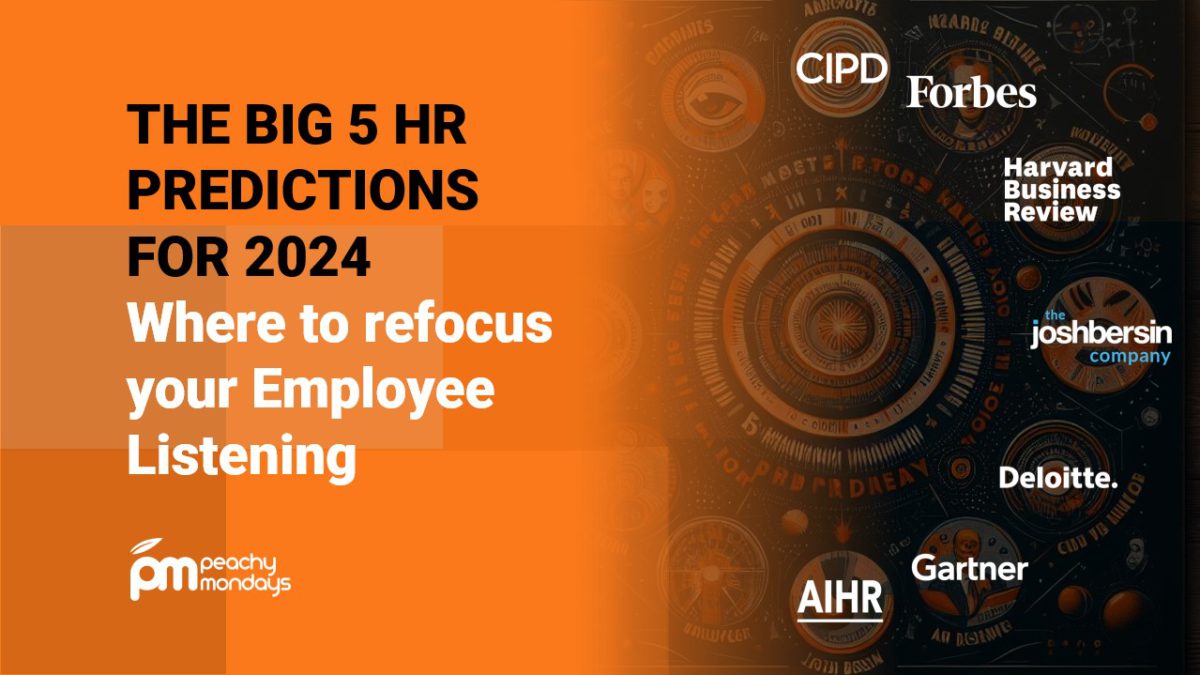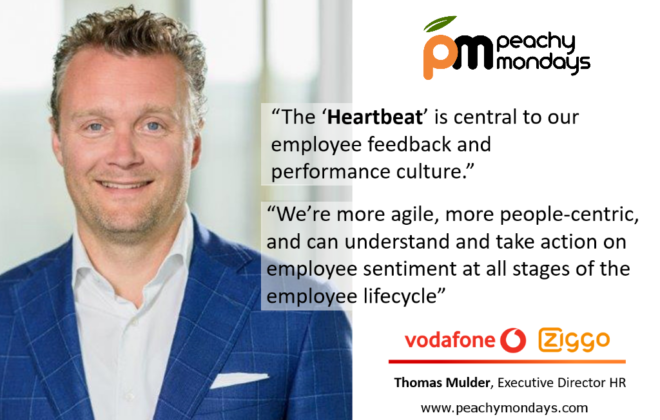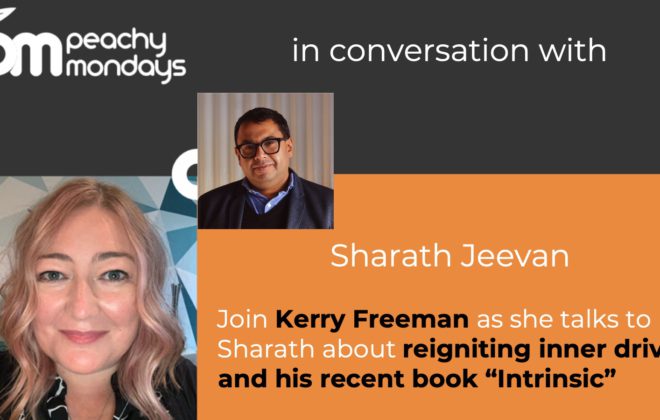The Big 5 HR Predictions for 2024: Where to refocus your Employee Listening
January is full of predictions about what the year ahead will hold for HR and the employee experience (EX). It’s enough to make your head spin! We’ve attended the webinars, read the articles, and ruminated on the data to make our own top five, and considered how employee listening can help us understand and adapt the employee experience for each:
- Creating sustainable culture: We’re craving connection, belonging, purpose and healthy, sustainable workplaces, and those things revolve around organisational culture. HR are generally in the driving seat for culture change – so our task is to create clarity about the desired organisational culture, to align and connect employees to the culture, especially in a hybrid work environment, and to help foster healthy and vibrant microcultures within teams and departments. An effective employee listening strategy is essential for any culture development work and could help you diagnose your current and goal culture (Free text questions are enormously helpful for this), identify helpful and unhelpful microcultures across your organisation, and monitor behavioural change. Employee Listening is also critically important to ensure you are hearing the voices of minority or marginalised groups, which can help to bring to light any unintended barriers and challenges to full inclusion and belonging.
- Purposeful Leadership: One of the most important priorities for HR leaders continues to be about evolving the role and expectations of leaders and managers, who are overwhelmed by the growth and complexity of their responsibilities, and that’s leading to more burn-out. Employee listening data can be a key tool for developing effective leaders and managers to help you identify ‘bright spots’ of leadership – those who are already doing a great job, and what their “DNA’ is that’s really working in the context of your organisation. It can also help you examine any disconnects between leadership levels and benchmark your leadership capability against others, or understand your progress over time. You could also use tailored 360-degree surveys to understand perceptions of leadership and development goals and gaps.
- Embracing new technology: HR leaders will need to think about, adopt and implement new technologies, such as artificial intelligence (AI) and generative AI (GenAI), to enhance HR processes and outcomes. HR will also need to evaluate the governance, readiness, risks, and ethics of these technologies. Employee Listening tools are already embracing GenAI tools to really enhance the data analysis and generating powerful actions – at Peachy Mondays AI has revolutionised free text comments analysis and we’re thinking about how this can help really personalise the survey experience. But you can also use your employee listening tools to understand how receptive and ready people are for this transformational technology that will impact on almost every job over time.
- Managing Change: The pace of change is relentless and will continue to be. The average ‘lifespan’ of organisations is decreasing, which means only the adaptive will survive. HR leaders will need to anticipate and mitigate the impact of change fatigue on employees, who are facing continuous and stacked changes not only in their work lives, but also their personal lives. Employee listening is crucial for managing change effectively, as it can help understand the impact and implications of change on employees, as well as their readiness and resistance to change. It may help you to understand which colleagues need more support, and which colleagues are ready for more. Employee listening can also be used to help engage people in change – capturing ideas, feedback and concerns about change, which can increase their trust and commitment.
- More flexible approaches to careers and internal mobility: People are seeking more autonomy, flexibility and variety in their work. The traditional career ladder is of less interest to those entering the workforce than purposeful and interesting work. The focus needs to shift from job requirements to people capabilities and so HR leaders will create more flexible and personalised learning and career options paths for employees. Employee listening is important for supporting career management and internal mobility, as it can help identify and address the aspirations, preferences, and skills of employees, as well as the opportunities and barriers for their career development.
In conclusion
The HR trends for 2024 highlight the importance and challenges of leading, managing, and engaging a diverse and dynamic workforce in a hybrid and changing work environment.
To succeed in this context, HR leaders should align their employee listening strategy with their short and long term people strategy to really get the maximum benefit from it. Employee Feedback is a very practical and valuable gift – and a well thought-out approach and set of flexible questions, together with new technologies to analyse and prioritise actions, means we can get the most from that gift, and not even think about searching for the receipt.
In the next blog in this series we’ll take a deeper look into developing effective leaders and managers, helping you identify ‘bright spots’ and their leadership ‘DNA’.
Research Sources: What Will HR Focus on in 2024 | Gartner : 9 Trends That Will Shape Work in 2024 and Beyond | Harvard Business Review : Top 5 Trends Expected To Drive HR In 2024 | Forbes: People Profession 2030 future trends | CIPD : 7 Key Strategic HR Initiatives For A Triumphant 2024 | Forbes : Advance Your Workforce Listening Strategy | Deloitte US : Employee Listening Strategy: 10 Actionable Tips for Success | AIHR : HR Predictions for 2024: The Global Search For Productivity | Josh Bersin
Related Posts
Categories
- Case Study (13)
- Change and transformation (21)
- Connectedness (4)
- Culture (17)
- Design (10)
- Diversity and Inclusion (1)
- Effectiveness (16)
- Employee engagement (60)
- Employee experience (43)
- Employee Feedback (51)
- Employee Wellbeing (1)
- Events (10)
- Financial Wellbeing (1)
- Happiness (4)
- Internal Communications (10)
- News (24)
- Onboarding (1)
- Organisational Effectiveness (18)
- Uncategorized (3)




